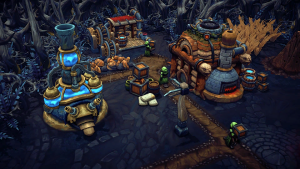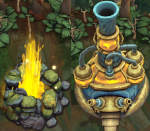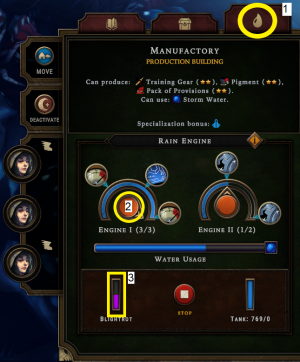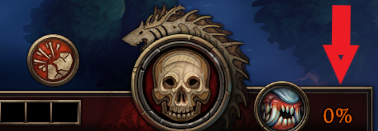Rainpunk: Difference between revisions
No edit summary |
|||
| Line 4: | Line 4: | ||
[[File:Icon_Rainpunk_LowStrain.png|94px|left|border|Rain Engines]] Viceroys can now take advantage of the Rain to power their buildings, but not without a cost! [[Blightrot]] will grow in [[Rain Engines]] as Viceroys use them, the more [[Rainwater]] that runs through an engine, the faster [[File:Icon_UI_Blightrot.png|16px]] Blightrot Cysts will spawn. While Rainpunk is essential for any Viceroy playing on higher difficulties, it is a delicate balance between using Rainwater Engines and keeping the Blightrot at bay, as Blightrot likes to eat villagers. Blightrot scales with difficulty, so prepare to fight for your life at higher [[Prestige]] levels... | [[File:Icon_Rainpunk_LowStrain.png|94px|left|border|Rain Engines]] Viceroys can now take advantage of the Rain to power their buildings, but not without a cost! [[Blightrot]] will grow in [[Rain Engines]] as Viceroys use them, the more [[Rainwater]] that runs through an engine, the faster [[File:Icon_UI_Blightrot.png|16px]] Blightrot Cysts will spawn. While Rainpunk is essential for any Viceroy playing on higher difficulties, it is a delicate balance between using Rainwater Engines and keeping the Blightrot at bay, as Blightrot likes to eat villagers. Blightrot scales with difficulty, so prepare to fight for your life at higher [[Prestige]] levels... | ||
<br /> | |||
== | == Types of Rainwater == | ||
There are 3 types of Rainwater, each type will power different types of buildings. [[File:DrizzleWaterCircle.png|16px]] [[Drizzle]] water powers buildings that produce food, [[File:ClearanceWaterCircle.png|16px]] [[Clearance]] water powers crafting and artistry buildings, and [[File:StormWaterCircle.png|16px]] [[Storm]] water powers heavy industrial buildings producing fuels and metals. | |||
<br /> | |||
{| class="wikitable" | |||
|- style="font-weight:bold; text-align:center;" | |||
[[File: | ! [[File:ClearanceWaterCircle.png|16px]] Clearance | ||
! [[File:DrizzleWaterCircle.png|16px]] Drizzle | |||
! [[File:StormWaterCircle.png|16px]] Storm | |||
|- | |||
== | | {{bl|Alchemist's Hut|med}} | ||
| {{bl|Bakery|med}} | |||
[[File: | | {{bl|Brickyard|med}} | ||
[[File: | |- | ||
| {{bl|Apothecary|med}} | |||
| {{bl|Beanery|med}} | |||
| {{bl|Carpenter|med}} | |||
|- | |||
| {{bl|Artisan|med}} | |||
| {{bl|Brick Oven|med}} | |||
| {{bl|Crude Workstation|med}} | |||
|- | |||
| {{bl|Clay Pit|med}} | |||
| {{bl|Butcher|med}} | |||
| {{bl|Finesmith|med}} | |||
|- | |||
| {{bl|Clothier|med}} | |||
| {{bl|Cellar|med}} | |||
| {{bl|Furnace|med}} | |||
|- | |||
| {{bl|Cooperage|med}} | |||
| {{bl|Cookhouse|med}} | |||
| {{bl|Kiln|med}} | |||
|- | |||
| {{bl|Druid's Hut|med}} | |||
| {{bl|Distillery|med}} | |||
| {{bl|Lumber Mill|med}} | |||
|- | |||
| {{bl|Leatherworker|med}} | |||
| {{bl|Field Kitchen|med}} | |||
| {{bl|Manufactory|med}} | |||
|- | |||
| {{bl|Makeshift Post|med}} | |||
| {{bl|Granary|med}} | |||
| {{bl|Smelter|med}} | |||
|- | |||
| {{bl|Press|med}} | |||
| {{bl|Greenhouse|med}} | |||
| {{bl|Smithy|med}} | |||
|- | |||
| {{bl|Provisioner|med}} | |||
| {{bl|Grill|med}} | |||
| {{bl|Tinkerer|med}} | |||
|- | |||
| {{bl|Rain Mill|med}} | |||
| {{bl|Ranch|med}} | |||
| {{bl|Toolshop|med}} | |||
|- | |||
| {{bl|Scribe|med}} | |||
| {{bl|Smokehouse|med}} | |||
| {{bl|Workshop|med}} | |||
|- | |||
| {{bl|Stamping Mill|med}} | |||
| {{bl|Teahouse|med}} | |||
| | |||
|- | |||
| {{bl|Supplier|med}} | |||
| {{bl|Tinctury|med}} | |||
| | |||
|- | |||
| {{bl|Weaver|med}} | |||
| | |||
| | |||
|} | |||
== Sourcing Rainwater == | == Sourcing Rainwater == | ||
| Line 36: | Line 92: | ||
so you can only collect [[File:ClearanceWaterCircle.png|16px]] [[Clearance Water]] during the [[Clearance Season]], and so forth. | so you can only collect [[File:ClearanceWaterCircle.png|16px]] [[Clearance Water]] during the [[Clearance Season]], and so forth. | ||
<br /><br /><br /> | <br /><br /><br /> | ||
== Engine Usage == | == Engine Usage == | ||
| Line 59: | Line 109: | ||
*1 - Workers gain 5 [[Resolve]]. | *1 - Workers gain 5 [[Resolve]]. | ||
*2 - Workers gain a further 5 [[Resolve]] | *2 - Workers gain a further 5 [[Resolve]] | ||
<br /><br /> | |||
== Blightrot == | |||
[[File:BlightrotLevel.png|right|border|Blightrot %]] Blightrot generates Blight Cysts and these cysts generate [[Hearth Corruption]] with continued Rainwater usage. The '''more water you use, the more Blight Cysts and [[Corruption]]''' generate. You can view your [[Hearth#Corruption|Hearth Corruption]] percentage on the bottom right of your screen. Clicking on the [[File:Icon_UI_Blightrot.png|32px|link=Hearth#Corruption|Blightrot]] Icon will take you to the [[Hearth#Corruption|Hearth Corruption]] information page, where you can view how many Blightrot Cysts have generated as well as how much Blightrot generation you can spare until 3 random [[Villagers]] die. | |||
== Blightrot Cysts and Removal == | |||
[[Corruption]] can be removed by burning Blight Cysts with [[File:Icon Resource PurgingFire.png|16px]] Purging Fire produced in the [[Blightpost]] by [[Blightfighters]], which are [[Villagers]] assigned to the [[Blightpost]]. | |||
[[File:Closedcyst.png|left|thumb|150px|A closed Blightrot Cyst]] | |||
[[File:Opencyst.png|right|thumb|150px|An open Blightrot Cyst]] <br /><br /> | |||
On the left is a closed Blightrot Cyst, cysts will remain closed during [[Drizzle Season]] and [[Clearance Season]], and they are invulnerable during this time. On the right is an open Blightrot Cyst, cysts will open during the [[Storm Season]], and they are now vulnerable and able to be burned off with [[File:Icon Resource PurgingFire.png|16px]] Purging Fire by [[Blightfighters]]. | |||
<br /><br /><br /><br /> | |||
==== Blightpost, Blightfighters and Purging Fire ==== | |||
[[File:Blight Post icon.png|left|thumb|150px|A Blightpost]] | |||
[[File:Blightfighter.png|right|thumb|150px|A Blightfighter burning a Blight Cyst]] <br /><br /> | |||
On the left is a Blightpost, an essential [[Building]] used to produce [[File:Icon Resource PurgingFire.png|16px]] Purging Fire which Blightfighters (Villagers assigned to the Blightpost) then use to burn off Blight Cysts during the [[Storm Season]]. Viceroys can also build a Hydrant to store extra Purging Fire near buildings that have grown a lot of Cysts. | |||
<br /><br /><br /><br /><br /> | |||
Revision as of 10:19, 20 November 2023
Overview
Viceroys can now take advantage of the Rain to power their buildings, but not without a cost! Blightrot will grow in Rain Engines as Viceroys use them, the more Rainwater that runs through an engine, the faster ![]() Blightrot Cysts will spawn. While Rainpunk is essential for any Viceroy playing on higher difficulties, it is a delicate balance between using Rainwater Engines and keeping the Blightrot at bay, as Blightrot likes to eat villagers. Blightrot scales with difficulty, so prepare to fight for your life at higher Prestige levels...
Blightrot Cysts will spawn. While Rainpunk is essential for any Viceroy playing on higher difficulties, it is a delicate balance between using Rainwater Engines and keeping the Blightrot at bay, as Blightrot likes to eat villagers. Blightrot scales with difficulty, so prepare to fight for your life at higher Prestige levels...
Types of Rainwater
There are 3 types of Rainwater, each type will power different types of buildings. ![]() Drizzle water powers buildings that produce food,
Drizzle water powers buildings that produce food, ![]() Clearance water powers crafting and artistry buildings, and
Clearance water powers crafting and artistry buildings, and ![]() Storm water powers heavy industrial buildings producing fuels and metals.
Storm water powers heavy industrial buildings producing fuels and metals.
Sourcing Rainwater
Rainwater can be collected in two ways:
- Building Geyser Pumps on top of Water Geysers.
- Collecting Rainwater from the sky via buildings such as the Rainwater Collector and Advanced Rainwater Collector.
If you choose to collect Rainwater via a Rainwater Collector, be aware the type of Rainwater collected changes with each season,
so you can only collect ![]() Clearance Water during the Clearance Season, and so forth.
Clearance Water during the Clearance Season, and so forth.
Engine Usage
Viceroys can control how much water, and for what purpose, is used in a Building. To the left we can see a Viceroy clicked on the 3rd panel of a Building information box to open the engine controls of a Manufactory.
Here you can select which perks you would like to enjoy when using Rainwater, as well as how much Rainwater you would like to use. On the bottom left of the information box, we can see a Blightrot meter. This meter shows you how much Blightrot your engines are spawning.
Engine Controls are as follows:
Left:
- 1 - Increase production speed by 50%.
- 2 - Increase chance of double production yields by 25%.
- 3 - Increase production speed by a further 50%.
Right:
Blightrot
Blightrot generates Blight Cysts and these cysts generate Hearth Corruption with continued Rainwater usage. The more water you use, the more Blight Cysts and Corruption generate. You can view your Hearth Corruption percentage on the bottom right of your screen. Clicking on the ![]() Icon will take you to the Hearth Corruption information page, where you can view how many Blightrot Cysts have generated as well as how much Blightrot generation you can spare until 3 random Villagers die.
Icon will take you to the Hearth Corruption information page, where you can view how many Blightrot Cysts have generated as well as how much Blightrot generation you can spare until 3 random Villagers die.
Blightrot Cysts and Removal
Corruption can be removed by burning Blight Cysts with ![]() Purging Fire produced in the Blightpost by Blightfighters, which are Villagers assigned to the Blightpost.
Purging Fire produced in the Blightpost by Blightfighters, which are Villagers assigned to the Blightpost.
On the left is a closed Blightrot Cyst, cysts will remain closed during Drizzle Season and Clearance Season, and they are invulnerable during this time. On the right is an open Blightrot Cyst, cysts will open during the Storm Season, and they are now vulnerable and able to be burned off with ![]() Purging Fire by Blightfighters.
Purging Fire by Blightfighters.
Blightpost, Blightfighters and Purging Fire
On the left is a Blightpost, an essential Building used to produce ![]() Purging Fire which Blightfighters (Villagers assigned to the Blightpost) then use to burn off Blight Cysts during the Storm Season. Viceroys can also build a Hydrant to store extra Purging Fire near buildings that have grown a lot of Cysts.
Purging Fire which Blightfighters (Villagers assigned to the Blightpost) then use to burn off Blight Cysts during the Storm Season. Viceroys can also build a Hydrant to store extra Purging Fire near buildings that have grown a lot of Cysts.
 Hooded Horse Wikis
Hooded Horse Wikis






